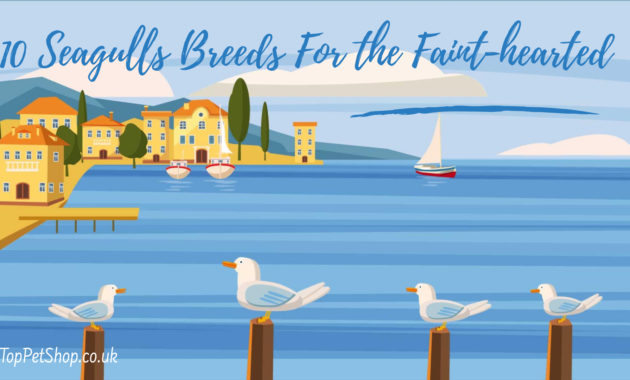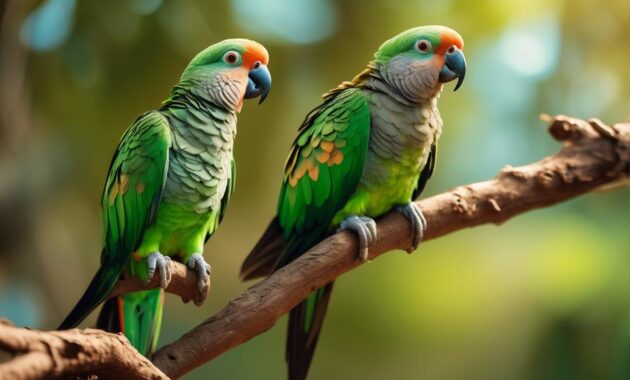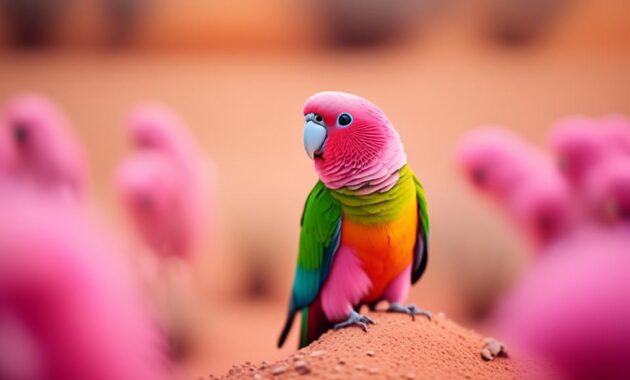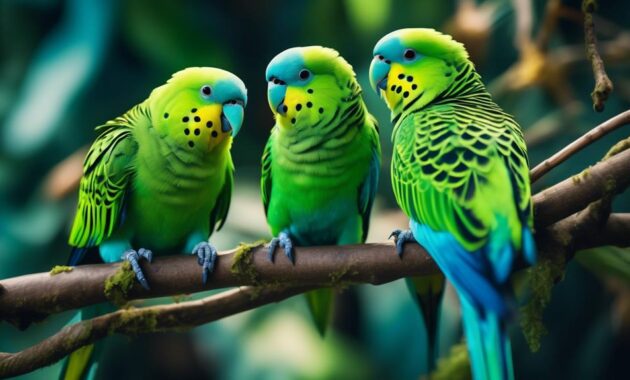
Are you ready to step into the world of Blue Crowned Conures, where vibrant colors meet charming personalities?
These medium-sized parrots may appear like a work of art with their deep green bodies and eye-catching turquoise blue cheeks, but there is so much more to discover.
From their native region in Colombia to Argentina, to their ability to mimic sounds and learn words, these feathered friends have an intriguing story waiting to unfold.
And don’t worry, we’ll also discuss their lifespan, social behavior, health requirements, and more.
So, get ready to embark on this exciting journey and uncover the captivating secrets of Blue Crowned Conures.
Key Takeaways
- Blue Crowned Conures are medium-sized pet birds with a long lifespan of 30-40 years.
- They belong to the Conure bird species and are comparable to Sun Conures and Hyacinth Macaws.
- Blue Crowned Conures are native to the Neotropical region, ranging from Colombia to Argentina.
- They have a deep green body with turquoise blue cheeks, a white eye ring, and red tail feathers.
Size and Lifespan
Blue Crowned Conures are medium-sized pet birds with a long lifespan of 30-40 years, making them a delightful long-term companion. These vibrant birds can grow up to 15 inches in length and have long tails. Due to their size and activity level, they require a roomy and large cage to ensure they get ample exercise.
Their long lifespan means that they can be a lifelong companion, providing you with years of joy and companionship. With their playful and affectionate nature, Blue Crowned Conures are truly one of the best pet parrots you can get. They’re comparable to Sun Conures and Hyacinth Macaws in terms of their popularity as pets.
Bird Species and Comparable Breeds
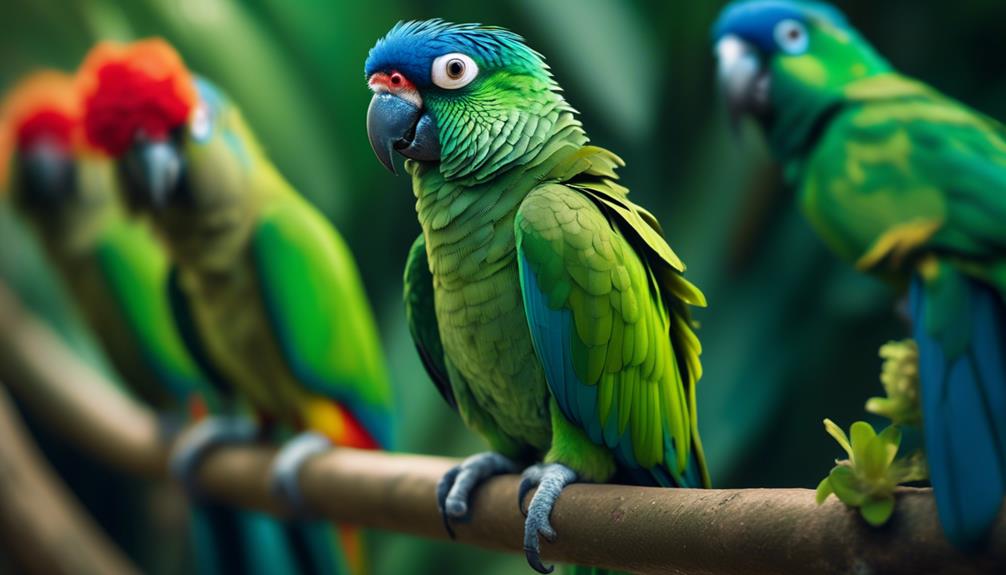
With their vibrant colors and affectionate nature, Blue Crowned Conures belong to the Conure bird species and are often considered one of the best pet parrots you can get. They are comparable to Sun Conures and Hyacinth Macaws in terms of popularity as pets. Here is a table that compares these bird species:
| Bird Species | Size | Lifespan |
|---|---|---|
| Blue Crowned Conure | Medium-sized | 30-40 years |
| Sun Conure | Small-sized | 20-30 years |
| Hyacinth Macaw | Largest parrot | 60+ years |
Blue Crowned Conures are known for their cuddly and affectionate nature, making them popular pets. They have a fun and loving personality that many bird enthusiasts adore. Their vibrant colors, including a deep green body, turquoise blue cheeks, and red tail feathers, make them visually striking. Despite their small and chubby appearance, Blue Crowned Conures require a large cage and ample exercise space for their long-term companionship.
Native Region/Natural Habitat

Where do Blue Crowned Conures originate and what’s their natural habitat like?
Blue Crowned Conures are native to the Neotropical region, stretching from Colombia to Argentina. Their natural habitat mainly consists of forest edges, temperate woodlands, and savannas.
Here are four key characteristics of their natural habitat:
- Forest Edges: Blue Crowned Conures prefer to inhabit areas where forests meet open spaces. This allows them to have easy access to both shelter and open areas for foraging.
- Temperate Woodlands: These conures thrive in temperate woodlands, which provide them with a diverse range of plant species for feeding and nesting.
- Savannas: They’re also found in savannas, where they can find a mix of grassland and scattered trees, providing ample perching and nesting opportunities.
- Tree Holes: Blue Crowned Conures make their nests in tree holes. These cavities provide them with a safe and secure place to raise their young.
Understanding the native region and natural habitat of Blue Crowned Conures allows us to better appreciate their adaptability and unique characteristics.
Speech and Sounds
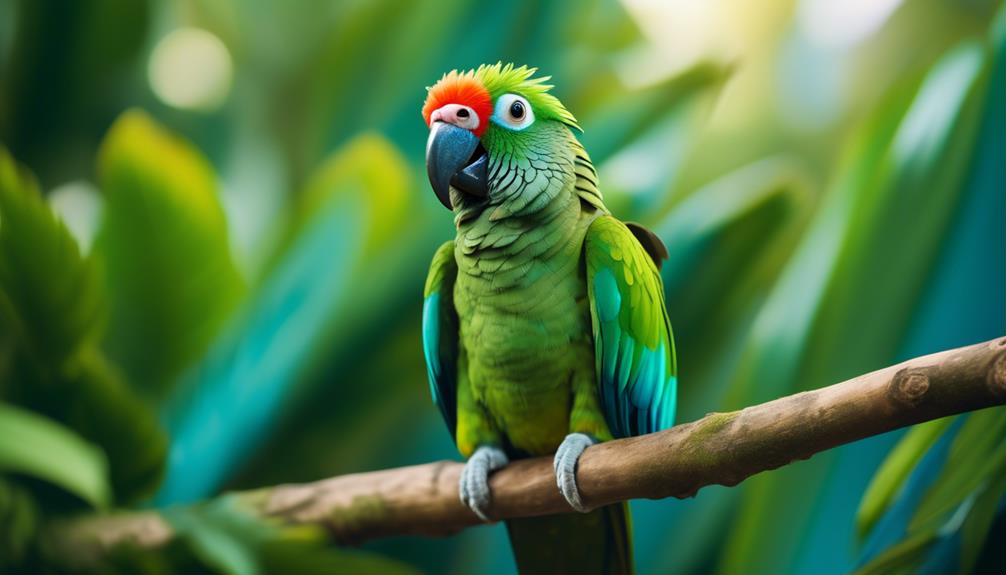
One intriguing aspect of Blue Crowned Conures is their unique ability to mimic sounds and learn a few common words and sentences. These medium-sized pet birds have moderate noise levels and emit high-pitched natural calls.
However, their real talent lies in their mimicry skills. With their comical and silly voice, they can imitate various sounds, including some human speech. Blue Crowned Conures have been known to murmur and mumble quietly, attempting to mimic human speech.
While they may not become fluent in conversation, their attempts can be entertaining and endearing. So, if you’re looking for a pet that can add a touch of vocal variety to your household, a Blue Crowned Conure might just be the perfect choice for you.
Colors and Overall Description
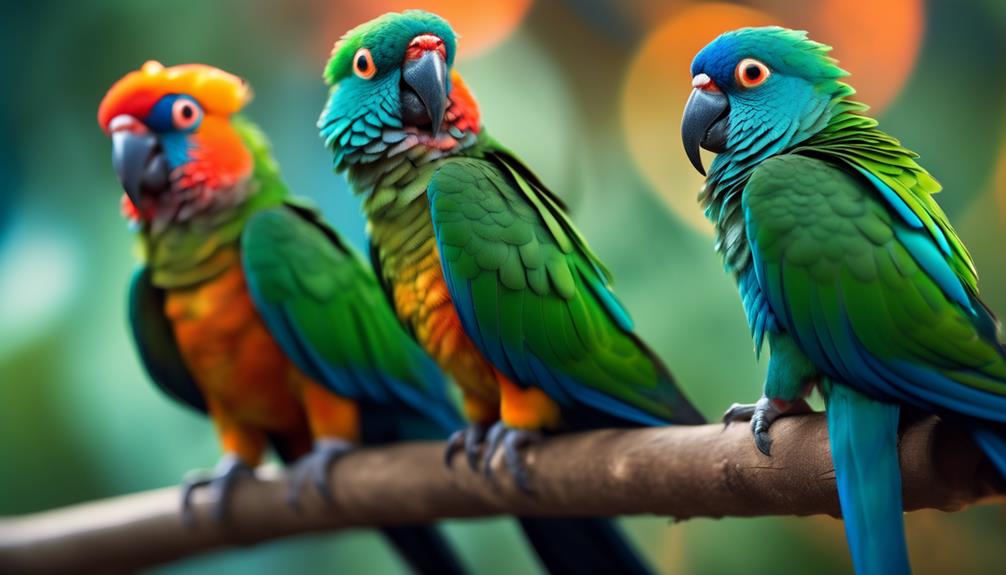
Now let’s shift our focus to the captivating colors and overall description of Blue Crowned Conures. These vibrant birds have a stunning appearance that’s sure to catch your eye. Here are four key features that make them truly unique:
- Deep green body with darker tones on the head and wings: The rich green color gives them a sense of elegance and beauty.
- Prominent turquoise blue shade on the cheeks and top of the head: This vibrant blue adds a pop of color and creates a striking contrast against the green feathers.
- White ring around the eyes: This feature highlights their expressive eyes and adds a touch of charm to their overall appearance.
- Striking red on the underside of the tail feathers: The vibrant red color adds a bold and eye-catching element to their plumage.
With their simple yet elegant coloration, Blue Crowned Conures are truly a sight to behold.
Don’t let their small and chubby look fool you – they require a spacious cage and ample exercise space to thrive and stay healthy.
Diet and Feeding Habits
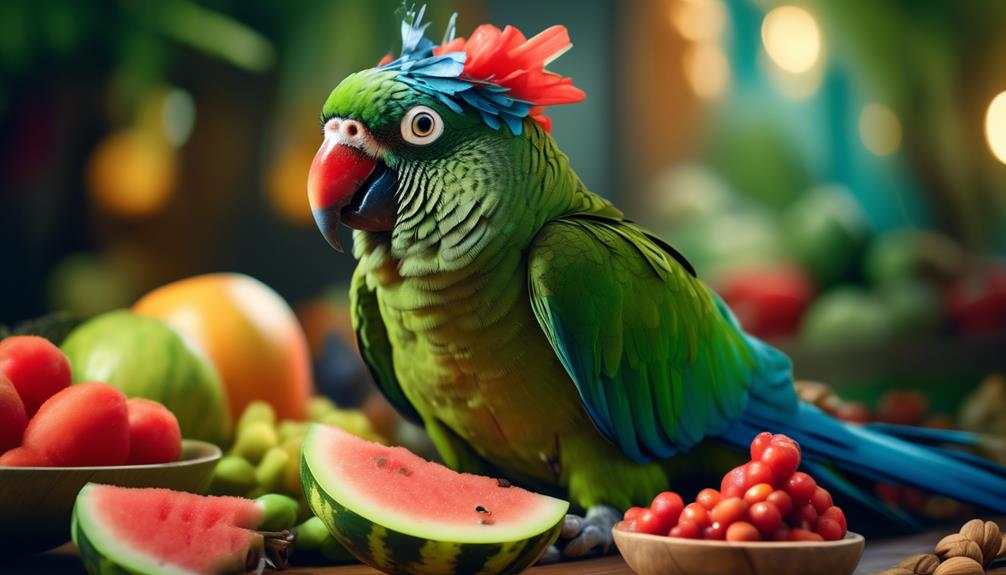
To ensure the health and well-being of your Blue Crowned Conure, it’s important to understand their diet and feeding habits.
Blue Crowned Conures have a varied diet that consists of both fresh fruits and vegetables, as well as high-quality pellets and seeds. They enjoy a mix of colorful fruits such as apples, oranges, and berries, along with leafy greens like spinach and kale. It’s important to provide them with a balanced diet to meet their nutritional needs.
Additionally, Blue Crowned Conures enjoy foraging for food, so it’s beneficial to offer them toys and puzzles that stimulate their natural instinct to search for food.
Make sure to provide fresh water daily and monitor their food intake to maintain a healthy weight for your feathered friend.
Social Behavior and Interaction
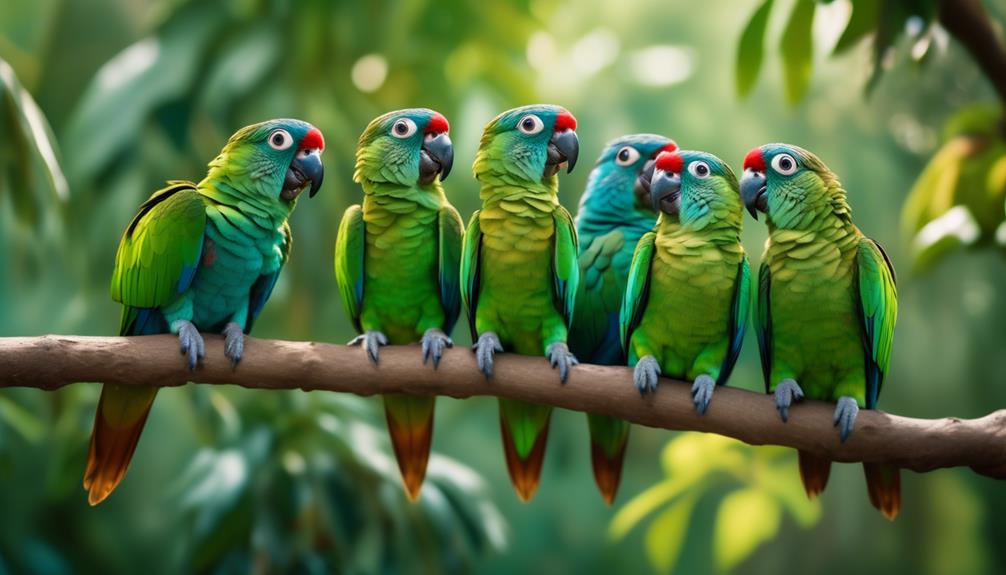
Understanding the diet and feeding habits of Blue Crowned Conures is crucial for their overall health and well-being; now let’s explore their social behavior and interaction.
Blue Crowned Conures are highly social birds that thrive on interaction with their human companions. Here are four key aspects of their social behavior:
- Affectionate nature: Blue Crowned Conures are known for their cuddly and affectionate nature. They enjoy snuggling and being close to their owners, often seeking physical contact and attention.
- Playful and energetic: These conures have a fun and loving personality. They love playing with toys, exploring their surroundings, and engaging in interactive playtime with their owners.
- Socialization needs: Blue Crowned Conures require regular socialization to maintain their mental well-being. They enjoy being part of the family and need plenty of social interaction, including being included in daily activities and spending quality time with their owners.
- Vocal communication: Blue Crowned Conures have a comical and silly voice. They murmur and mumble quietly to mimic human speech, and they can learn a few common words and sentences. Their vocalizations are a way for them to express their emotions and communicate with their owners.
Training and Intelligence
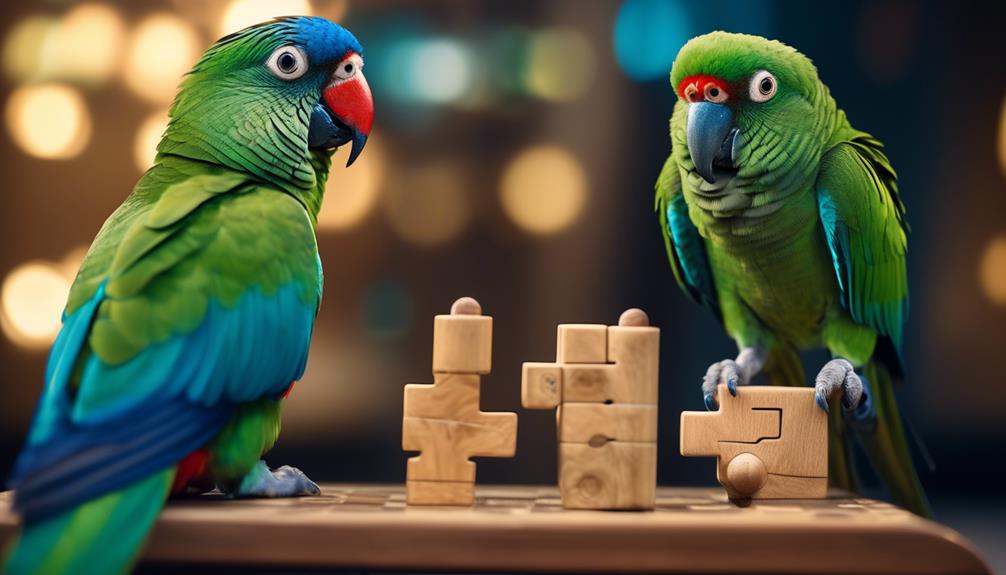
Training and intelligence are key aspects to consider when caring for Blue Crowned Conures. These birds are highly intelligent and can be easily trained, making them great companions. With patience and consistency, you can teach them tricks, such as waving or speaking simple words. They’ve the ability to mimic sounds and even learn a few common phrases.
Blue Crowned Conures thrive on mental stimulation, so it’s important to provide them with interactive toys and puzzles to keep their minds active. When training them, positive reinforcement techniques work best, such as rewarding them with treats or praise.
With their intelligence and eagerness to learn, Blue Crowned Conures can become well-behaved and entertaining pets.
Health and Care Requirements
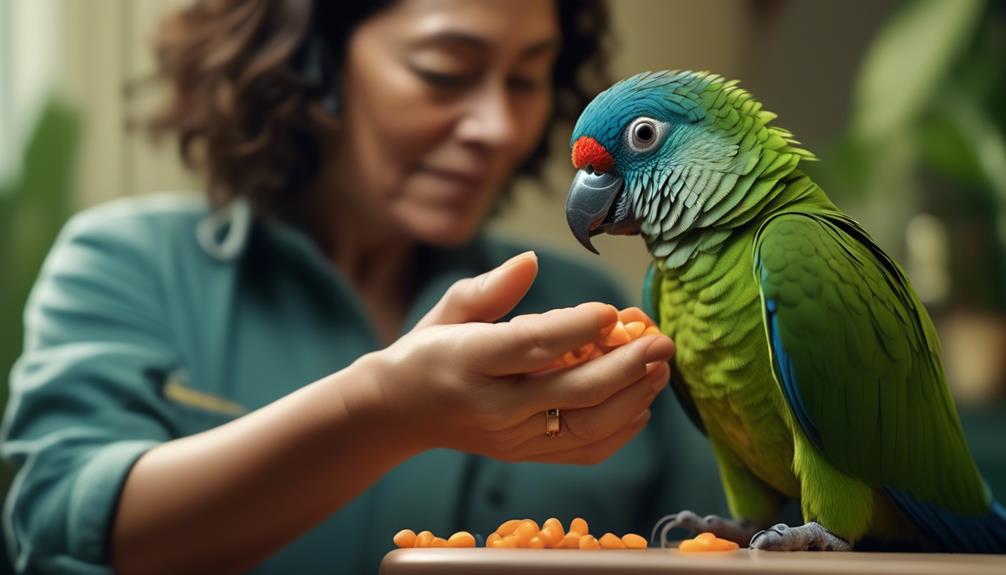
Taking proper care of Blue Crowned Conures is essential for their overall health and well-being. To ensure that your Blue Crowned Conure stays happy and healthy, here are a few important care requirements to keep in mind:
- Diet: Provide a balanced diet consisting of high-quality pellets, fresh fruits, vegetables, and occasional treats. Avoid feeding them foods that are high in fat, salt, or sugar.
- Exercise: Blue Crowned Conures are active birds that require plenty of exercise. Provide them with enough space to fly and explore, both inside their cage and outside during supervised playtime.
- Mental Stimulation: These intelligent birds need mental stimulation to prevent boredom. Offer them toys, puzzles, and interactive activities to keep their minds engaged and prevent behavioral problems.
- Veterinary Care: Regular check-ups with an avian veterinarian are crucial for maintaining your Blue Crowned Conure’s health. They’ll ensure that your bird is up to date on vaccinations and can address any health concerns that may arise.
Tips for Owning a Blue Crowned Conure
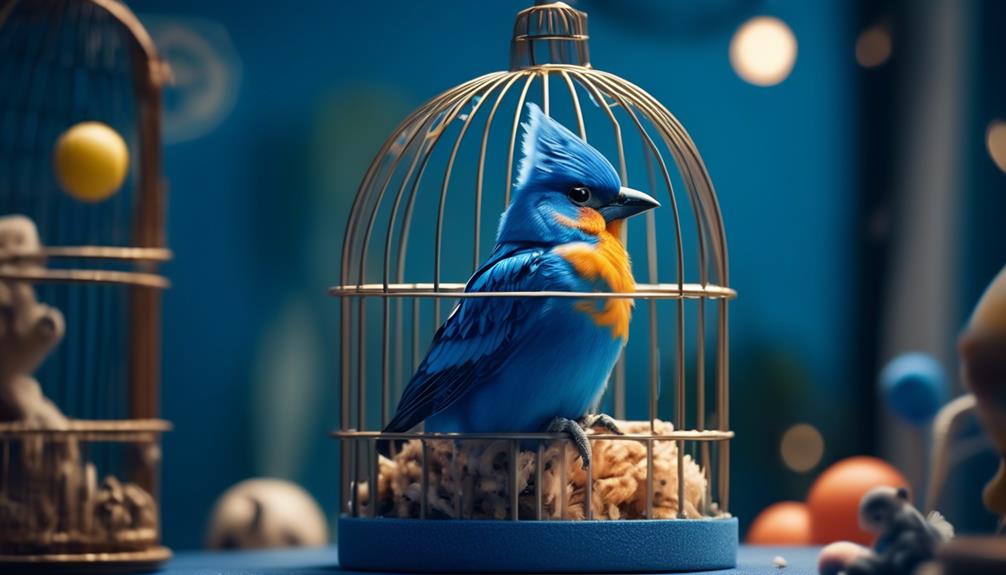
Now that you have a good understanding of the health and care requirements for Blue Crowned Conures, let’s explore some useful tips for owning one of these vibrant birds.
Firstly, provide your Blue Crowned Conure with a spacious cage that allows for ample exercise. These medium-sized birds have long tails and need plenty of room to stretch their wings.
Additionally, keep in mind that Blue Crowned Conures have a lifespan of 30-40 years, so be prepared for a long-term commitment. Make sure to spend quality time with your bird, as they’re known for their cuddly and affectionate nature.
Lastly, be mindful of their moderate noise levels and provide them with mental stimulation to keep them happy and entertained.
Frequently Asked Questions
Can Blue Crowned Conures Be Trained to Talk?
Yes, blue crowned conures can be trained to talk. They have the ability to learn a few common words and sentences. With patience and consistency, you can teach them to mimic human speech.
What Is the Average Price of a Blue Crowned Conure?
The average price of a Blue Crowned Conure can vary depending on factors such as location and breeder. You can expect to pay anywhere from $400 to $800 for a healthy and well-cared-for bird.
Do Blue Crowned Conures Require a Lot of Social Interaction?
Yes, blue crowned conures require a lot of social interaction. They are very affectionate and love to be around their human companions. Regular interaction and attention are important for their well-being.
Are Blue Crowned Conures Prone to Any Specific Health Issues?
Blue Crowned Conures are generally healthy birds, but they can be prone to some specific health issues. Regular vet check-ups and a balanced diet are important to ensure their well-being and prevent any potential problems.
How Often Should a Blue Crowned Conure Be Taken to the Vet for Check-Ups?
You should take your Blue Crowned Conure to the vet for regular check-ups at least once a year. This ensures their overall health and helps detect any potential issues early on.
How Does the Yellow Crowned Amazon Compare to the Blue Crowned Conure in Terms of Talkativeness and Timelessness?
The yellow-crowned amazon parrot profile reveals that these birds are known for their exceptional talking ability and can be quite chatty. On the other hand, the blue-crowned conure is also known for being talkative but may not be as timeless as the yellow-crowned amazon. Both are popular for their communication skills.
Conclusion
In conclusion, owning a Blue Crowned Conure is a fantastic choice for anyone looking for a vibrant and affectionate pet bird.
Their stunning appearance, playful personality, and ability to mimic sounds make them a joy to have around.
With their long lifespan and cuddly nature, they can be a long-term feathered friend that will keep you entertained for years to come.
Make sure to provide them with proper care and training to ensure their health and happiness.

